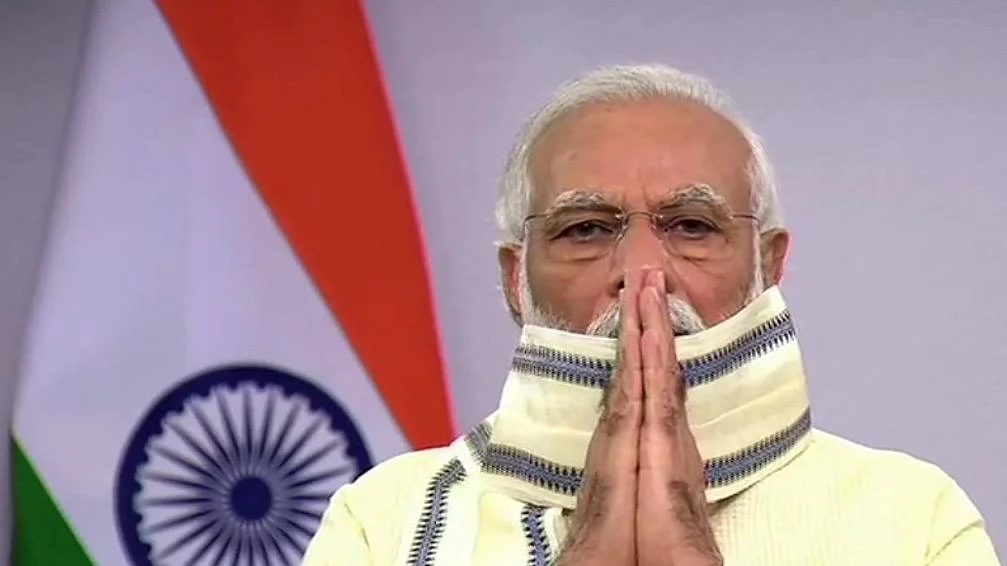PM launches Bihar poll campaign with address to the nation
While the PM again skipped any reference to China, he repeated what Finance Minister Nirmala Sitharaman has been saying for past 45 days. His calculations and Maths also remained as dubious as ever

Every time Prime Minister Narendra Modi decides to address the nation, there is more fear than anticipation. His sixth address to the nation, however, turned out a non-event as he extended an existing scheme while re-announcing what Finance Minister Nirmala Seetharaman had already announced 45 days ago.
The political undertones cannot be missed as the scheme to provide free food grains for poor has been extended up to November 20, practically till the end of the Bihar elections.
While the step announced by the Prime Minister should be welcomed by all, never mind the political undertones, the nation was expecting more from the Prime Minister’s sixth address to the nation during the COVID-19 crisis. Fact is that the government is facing serious financial pressures and well, there is nothing more that he can offer at this point.
The extension of free food grains scheme is expected to benefit 80 crore people and would cost the government around Rs 90,000 crore, which would mean a per-capita expenditure of Rs 1,125 for a period of five months. The financial benefit per capita per month would be around Rs 225 per month.
There might as well be some clever accountancy behind this as a large part of the Rs 90,000 crore would have been covered in the food subsidy bill, pegged at Rs 2.27 lakh crore for the financial year. Of this, Rs 1,15,570 crore was earmarked for the food grain distribution through the PDS. The government could have frontloaded a large part of this subsidy to this scheme and the actual additional outgo would be much lower than what the Prime Minister would like the nation to believe.
The case of ‘One Nation, One Ration Card’ is a curious one. Finance Minister made the announcement in her series of press conferences following the Prime Minister’s announcement of the Rs 20 lakh crore package and said the scheme would be introduced by March 2021. The question is: why did the Prime Minister declare what the Finance Minister had already declared 45 days ago?
The answer may lie in what has been happening over the last few days.
The government is under serious pressure on the China issue and does not have any money to make any meaningful intervention on the economic front. It seems to have abandoned the illusion of control over the fight against COVID-19 and left everything to the wisdom of the state governments.
It may also be a good time to evaluate how far the government has progressed. Disbursing loans adding to Rs 3 lakh crore under the Emergency Credit Line Guarantee Scheme (ECLGS) was one of the highlights of the scheme and banks have disbursed Rs 32,896 crore to 7.1 lakh borrowers, which is just about 9 percent of the scheme size. While there is still debate on if these schemes were enough to get the economy back on track, a 9% disbursement in the critical month only indicates how serious the government to providing relief.
What the Prime Minister, perhaps unwittingly, admitted on Tuesday was that citizens should not expect any direct financial support in the months to come. "In the last three months, Rs. 31,000 crore was sent directly to people’s accounts," the Prime Minister said and did not mention if any additional direct cash transfers would be made in the coming months.
The government’s fiscal stress is clearly visible in the way petrol and diesel prices have gone up over the last three weeks. While the government knows that it is opening itself to political attack due to these increases, it has no other option but to keep raising prices to the point where it becomes a serious political problem.
The government had imposed a Rs 3 per litre excise hike on petrol and diesel on March 15, which added Rs 2,300 crore during March.
International crude prices (Indian crude basket) started plummeting and slipped to $16.92 on April 27. The government suddenly realised that oil marketing companies were making a windfall profit of Rs 17-19 per litre. Starved of funds, the government raised excise duties on May 6, 2020: the rise was Rs 10 on petrol and diesel by Rs 13, taking the excise on petrol to Rs 32.98 and diesel to Rs 31.83.
Expected earnings from this excise hike, if allowed to run for the entire year, would be around Rs 1.60 lakh core and would be a Godsent for the government, but the problem for the government has been that crude prices have started rising again and have crossed the $40 mark. OMCs were forced to raise prices to stay afloat but a greater hike in petroleum prices will hurt the government.
It was important to mention the issue of petrol prices to highlight the kind of fiscal pressure the government finds itself due to a combined effect of a slowdown and a lockdown. As the nation opens up for business again, the real impact would only be visible now.
Free food to 80 crore Indians should be welcomed but crores of Indians were expecting more from their Prime Minister. Former Prime Minister Dr Manmohan Singh had once remarked that money does not grow on trees;Prime Minister Narendra Modi is now beginning to understand that being the PM is more than giving speeches and managing headlines.
Also Read: The Prime Minister’s chutzpah
Follow us on: Facebook, Twitter, Google News, Instagram
Join our official telegram channel (@nationalherald) and stay updated with the latest headlines
